
Are you a digital marketer? If yes, you might have heard this popular question: “Is SEO dead?”
A simple answer to this question is NO! SEO has changed a lot in recent years, and it’s expected to continue evolving in the near future. The major driver of this change is AI. Large language models (LLMs) such as ChatGPT, DeepSeek, Claude, and Gemini are changing the way we search.
LLMs are now a go-to platform for searching for anything, and they have even replaced Google search in many cases. Quite impressive, right?
This shift in search behavior also means a reassessment of your current SEO strategy and a long list of trial and errors before cracking the AI search optimization. To help you out here, we have created this guide. We are going to cover what LLM SEO is, how it works, its ranking factors, tools you can rely on, and how you can ensure better visibility for your website. So, let’s get started!
Table of Contents
What is LLM SEO?
LLM SEO is all about optimizing your website’s content for LLMs, so they can better answer users’ queries. A solid strategy and consistent efforts will help you achieve a significant number of visitors to your site. Also, optimizing your content for AI models can lead to LLMs recommending your brand to users.
Optimizing content for AI models is a bit different from traditional SEO. To set your site as an authoritative source for information, you need to share unique and comprehensive insights rather than focusing on rankings only.
Here are some things you should consider:
- Write in a conversational tone. Choose a simple & easy to understand writing style in which people usually ask questions.
- LLMs pick useful snippets from content just like search engine algorithms do. So, structure your content by using headings, FAQs, and lists.
- While writing content, add links to external sites that offer valuable information for users. Keep your sourcing transparent and follow Google’s E-E-A-T concept.
- There is a phrase, “Don’t put all your eggs in one basket.” The same applies here. LLMs extract info from multiple types of sources, such as text, video, images, and documents. So, showcase your expertise in different content types, and it will further enhance trust signals.
LLM SEO is a relatively new term, but it’s just another form of SEO, similar to Google SEO, Bing SEO, YouTube SEO, etc. No matter the form or platform, the goal of SEO remains the same – to help users with your expertise in any niche/domain.
How are AI and LLMs Changing the Search Behaviour?
The most important question you might be having right now is why LLM SEO has become so important in such a short time. The answer is simple: because they have revolutionized the search behavior of users in this short time.
Suppose you need to perform research about how website development works. When you search this on any search engine, you will have to go through multiple articles to get a clear idea. But what if we tell you that you can get all this information in one place within seconds? That’s what LLMs are doing.
Traditional search engines like Google rely on particular sets of sources for information. For example, Google relies on Google Knowledge Graph. Opposite to this, LLM models scan multiple sources available on the internet and pick the most relevant ones. Plus, these models are able to analyze the semantic content of a query. So, they can recognize the contextual relationship between the user’s query and available facts, then answer the question in a user-friendly manner.
The following is a screenshot of an answer taken from the Perplexity account, which is also an AI-powered search engine. The answer carries a relevant answer along with its references.
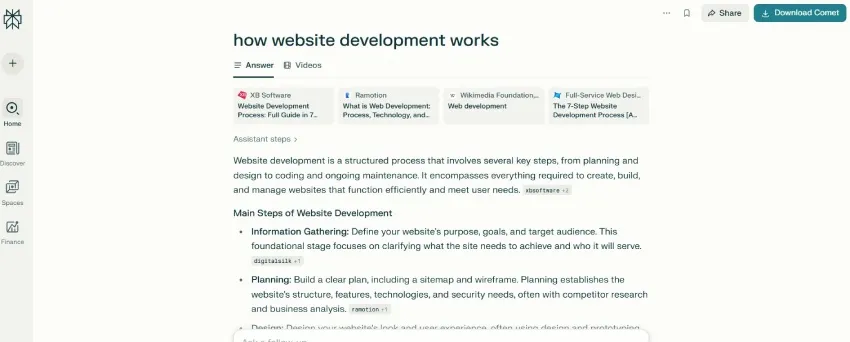
Core Ranking Factors for LLM SEO
Once you understand LLM SEO’s importance, you will be excited to integrate it into your current strategy. Before you brainstorm for ideas, it’s essential to evaluate the ranking factors so you can hit the bull’s eye.
Generally, ranking factors and their weightage differ from one AI model to another. But here are some common and most important factors you must consider:
- Content authority: LLM models prefer credible sources to offer valuable information.
- Semantic and contextual relevance: AI SEO doesn’t rely on exact match keywords just like traditional SEO. It reads and understands the content just like humans do. AI models use semantic signals to determine a website’s topical authority.
How Can You Optimize Content for LLM Search?
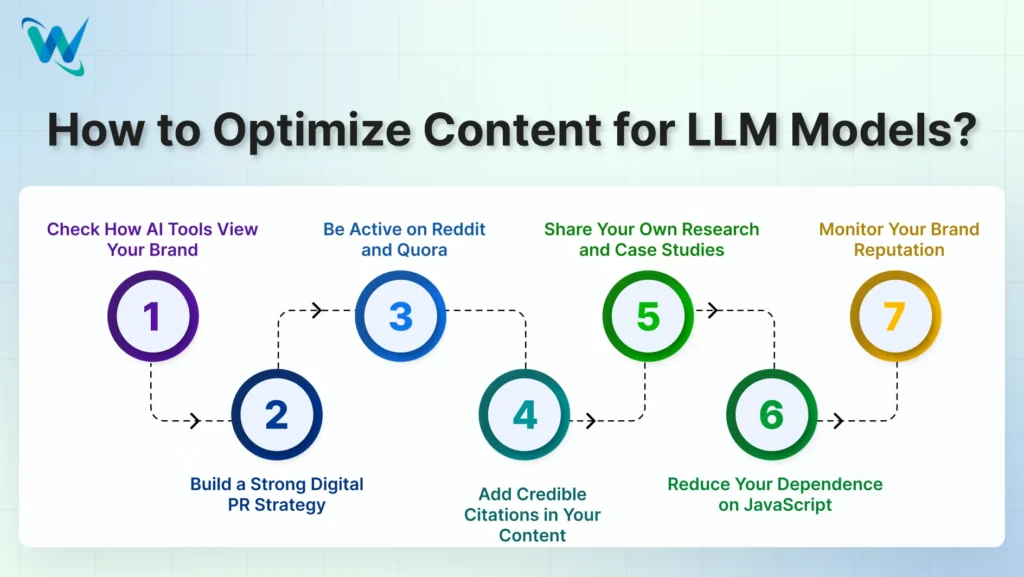
Now that you know why LLM SEO matters, the next big question is: how do you optimize your content for AI models?
Don’t worry, it’s not as complicated as it sounds. LLMs are designed to understand natural language, so if your content feels helpful and genuinely useful, you’re already halfway there.
But of course, strategy matters too. Just as you build digital marketing campaigns, you also need a clear plan for LLM SEO. The approach is slightly different from traditional SEO, but once you get used to it, the process becomes super smooth.
1. Check How AI Tools View Your Brand
Start by testing how different LLMs like ChatGPT, Gemini, Perplexity, and Claude talk about your brand. Ask them basic questions about your company, products, or services, and see what kind of answers they provide.
Do they mention your brand name? Are the details accurate? This will help you understand your brand’s visibility and reputation in AI-driven searches. You can also use AI mention-tracking tools to keep an eye on how often and where your brand is mentioned.
2. Build a Strong Digital PR Strategy
Getting your brand featured on trusted sites is more important than ever. LLMs pick up information from high-authority sources like industry blogs, media outlets, and research platforms. So, start pitching your content or insights to these sites. This will boost your site’s credibility and increase your chances of being referenced by AI tools.
3. Be Active on Reddit and Quora
Reddit and Quora are goldmines for LLMs because they contain user-generated discussions that are genuine in most cases. Join conversations in relevant subreddits or Quora threads and share insights based on your expertise.
But keep one thing in mind: don’t overpromote your brand. Authentic engagement builds trust and improves your visibility naturally.
4. Add Credible Citations in Your Content
LLMs prefer content that brings fresh insights. So try including original quotes, data points, or external references from reliable sources in your content. Basically, give AI models a reason to pick your page over others.
5. Share Your Own Research and Case Studies
If your time and budget allow, conduct in-depth studies and research relevant to your niche. Conduct surveys, publish case studies, or share unique data your team collected. This kind of original content not only attracts backlinks but also signals topical authority to LLMs.
6. Reduce Your Dependence on JavaScript
Most AI crawlers can’t process JavaScript-heavy pages properly. Make sure your key content is available in simple HTML. You can use server-side rendering to keep your site accessible to both humans and AI.
7. Monitor Your Brand Reputation
AI models also consider brand sentiment. So, regularly check online reviews, mentions, and social media discussions. Respond professionally to feedback and handle negative comments wisely; it all adds up to a stronger online presence.
Useful Tools for LLM SEO
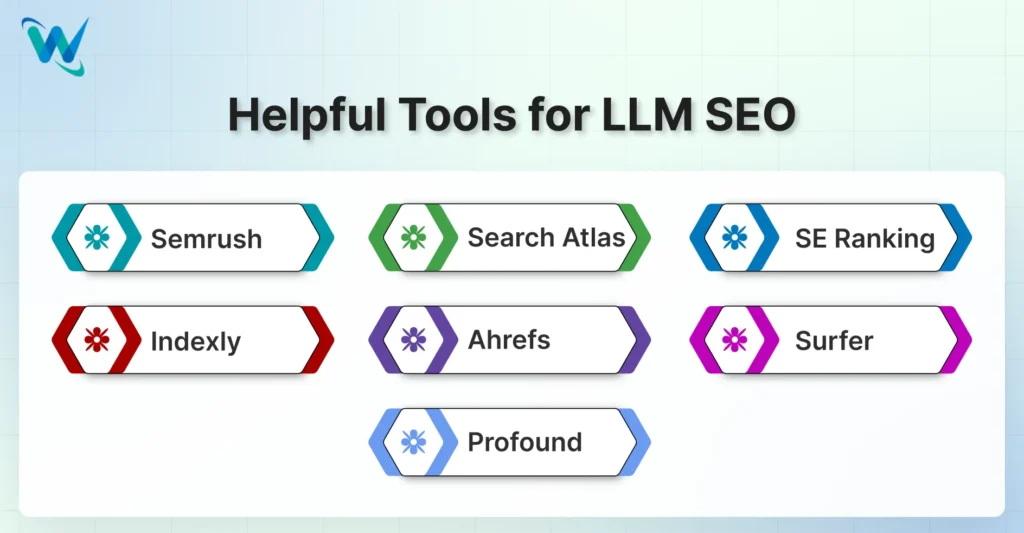
If you’re confused about how to track data and make your LLM SEO efforts more effective, don’t worry. There are tools available to help you through the process.
Here, we have listed some helpful LLM SEO tools that can help you discover new opportunities, track mentions, and keep your content relevant.
1. Semrush
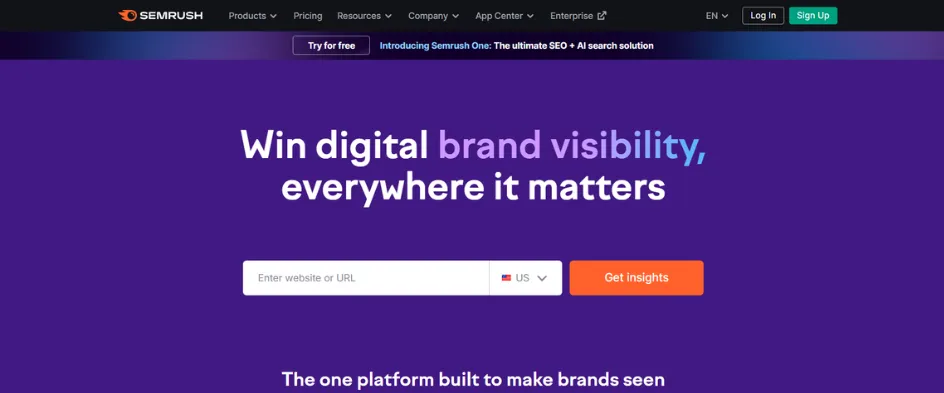
If you’re into SEO, you might have already used Semrush before. It’s an all-in-one tool. It now offers features specifically designed for LLM SEO.
With its AI Visibility Toolkit, Semrush helps you track how your brand is being represented across AI models and chatbots. You can analyze how often your brand is mentioned, what kind of tone is used when it’s mentioned, and even which questions trigger your brand’s appearance.
Key Features:
- Showcases an AI Visibility Score based on overall search performance in LLM models.
- Prompt tracking capabilities help you find relevant queries for your business and track them daily.
- AI crawler features in the site audit module help you identify technical issues that might prevent AI systems from crawling the content.
2. Search Atlas

Search Atlas is a powerful tool for AI SEO. It’s popular for its smart “OTTO SEO” feature, an automated AI assistant that helps you handle everything from keyword research and content writing to site audits.
Another LLM SEO tool from Search Atlas is QUEST. It allows you to check how your topic or brand appears across popular LLMs. Simply enter your keyword, and QUEST scans AI-generated answers to find the exact source URLs those models are referencing.
Key Features:
- OTTO SEO helps in improving semantic coverage and content performance.
- Local Citation Builder automates business listing distribution.
- The platform lets you track overall LLM visibility and sentiment analysis.
3. SE Ranking
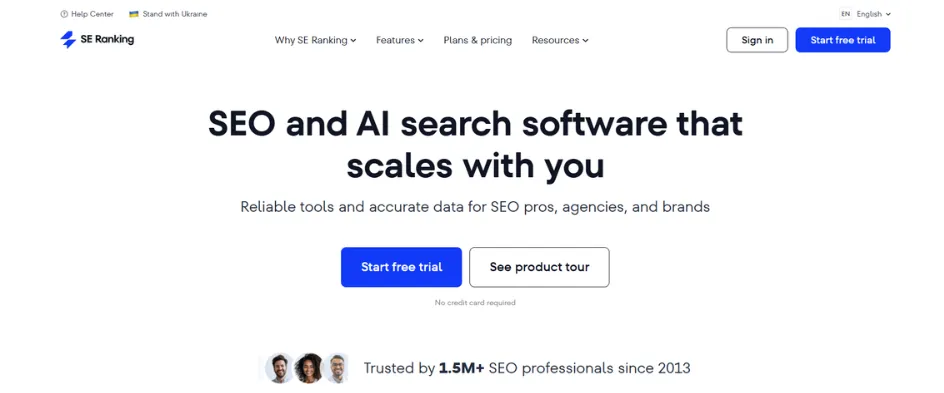
SE Ranking has introduced an AI Search Toolkit. It’s designed to help you monitor your visibility across AI tools like ChatGPT, Google AI, and AI Overviews.
With this toolkit, you can track how your brand is showing up in AI-powered search results, compare your visibility with competitors, and analyze prompt-level performance. You’ll also get a clear idea of which topics or keywords are helping your brand surface in AI responses.
Key Features:
- Track brand mentions of your site and competitors in one place to find opportunities.
- It helps in identifying which queries trigger AI Overviews and their search intent.
- Analyze historical data and trends to build a solid strategy.
4. Indexly
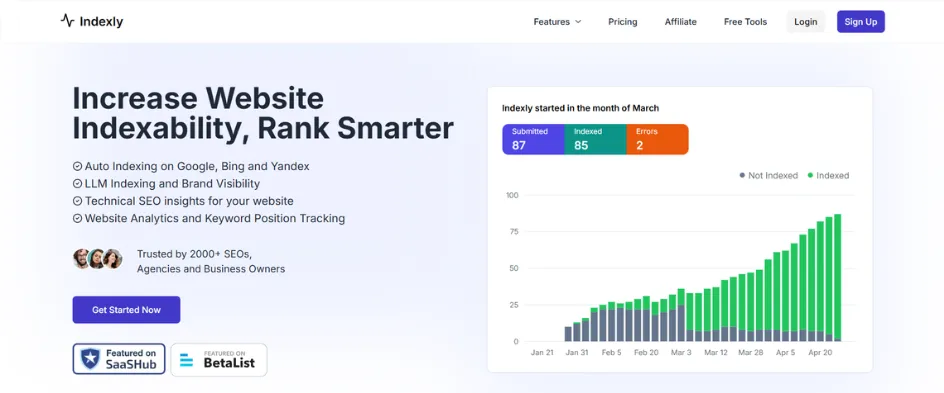
Indexly focuses on one of the most essential sides of LLM SEO: indexing. It helps ensure your website is accessible to LLM crawlers so your pages have a higher chance of being referenced in AI-generated answers.
Its AI crawlability checker scans your site and highlights technical issues that could stop LLMs from understanding or indexing your pages properly. It also supports the llms.txt standard, a new file format that works like robots.txt but specifically for AI models.
Key Features:
- Check how well your site can be crawled by LLM tools.
- Generate an llms.txt file for your site to improve LLM crawlability.
- Get detailed insights into traffic coming from AI tools.
5. Ahrefs

Ahrefs is a close competitor to Semrush. It now includes a set of LLM SEO features in its Brand Radar add-on. This allows you to track your AI share of voice, monitor citations, and measure how your brand appears across AI-generated results.
Its dashboard gives a clear overview of your search demand, web visibility, and AI performance trends. Though it’s priced higher than others, Ahrefs is one of the most reliable tools for deep brand performance tracking.
Key Features:
- See how often AI tools link to your content.
- Conduct content gap analysis for AI responses against competitors.
- Find out the top content formats AI tools use for responses.
6. Surfer
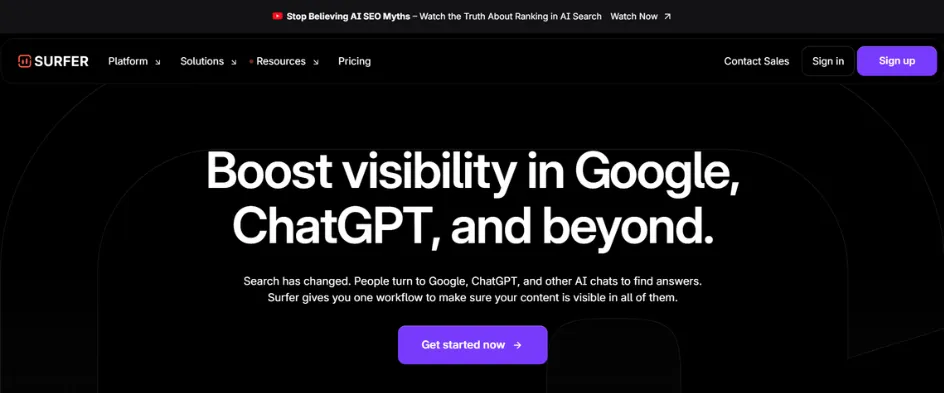
Surfer SEO now includes LLM visibility and tracking features that give you insights into how your content performs across leading AI models. It offers brand and keyword tracking, prompt-level insights, and the ability to identify which sources AI models are pulling from.
These features are available from the Scale plan and above, allowing you to track up to five prompts daily. The data visualization is also intuitive, so you can easily understand how your content performs in AI searches.
Key Features:
- Add branded or non-branded queries and track them regularly.
- Find out relevant content gap opportunities to focus on.
- Improve overall topical authority and coverage in semantic queries.
7. Profound
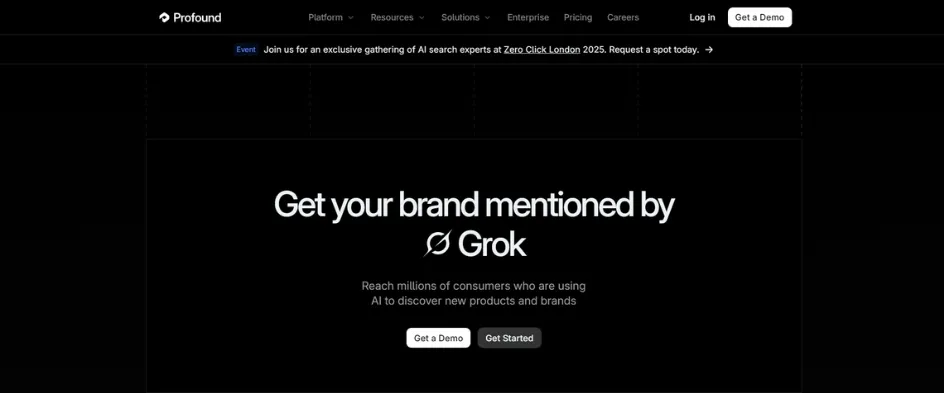
Profound is a famous tool built specifically for LLM Optimization (LLMO). It focuses entirely on understanding how AI models interpret and discuss your content. So you have a behind-the-scenes view of your brand’s presence in the AI world.
The platform provides detailed reports on AI-driven traffic, conversation volume, and citation frequency. It also includes agentic analytics, which show you how AI agents interact with or refer to your content.
Key Features:
- Find relevant topics and keywords across different LLM models with search volumes.
- Monitor your brand’s visibility in AI tools and analyze trends across different regions and languages.
- Compare your AI visibility against competitors.
How Can You Measure Success in LLM SEO?
As you already know, LLM SEO is different from traditional SEO. Here, tracking success isn’t as simple as checking Google rankings or traffic reports.
Instead of focusing only on clicks and impressions, you should see how often AI models mention your brand and what kind of context they use. Success in AI SEO is all about visibility and credibility. Let’s explore a few ways in which you can track how your efforts have paid off:
1. Brand Mention Frequency
Brand mention frequency is your new ranking. Track how often AI tools reference your brand or use your content in their responses. The more relevant mentions, the stronger your authority.
2. Referral Traffic Quality
Visitors coming from AI platforms behave differently. They usually spend more time on your page, bounce less, and convert better. It’s because AI already pre-qualified them. Monitor these patterns closely to measure true impact.
3. Citation Quality
Success in LLM SEO is not only about being mentioned; it’s about where. Getting cited alongside trusted names like Wikipedia or Forbes shows higher credibility than appearing next to random blogs.
4. Zero-Click Brand Attribution
AI might not always link to your site, but brand mentions can still drive search interest. Watch for spikes in branded keywords’ search volumes after major AI citations.
5. Testing AI Authority
Manually check your visibility across ChatGPT, Gemini, Claude, and Perplexity. See how often your brand appears, which prompts trigger mentions, and how you compare to competitors.
Common LLM SEO Mistakes You Must Avoid
LLM SEO is a new form, and even the most experienced marketers are figuring it out. So, mistakes are going to happen.
To avoid costly mistakes for your brand, here are some things you should keep in mind:
- Writing Like a Robot: If your content looks AI-written, it loses its natural tone. And yes, even AI can detect AI-generated content.
- Never Updating Old Content: Leaving your posts untouched for years makes them look outdated. Regular updates show that your information is still relevant.
- No Author or Editorial Info: When there’s no face or voice behind your content, it feels less credible. Adding author names or short bios builds trust.
- Ignoring Internal Links: Orphan pages are hard for AI to connect to and understand. Keep your content linked together naturally.
If your content feels generic or outdated, AI won’t trust it. And if it doesn’t trust you, it won’t mention you either.
What the Future Holds?
Search is always changing and evolving. And for the next 10 or more years, AI is going to lead this change. SEO is now becoming more contextual. What used to be about matching keywords is now about understanding intent, context, and trust.
LLM models are going to revolutionize the SEO industry in many ways. Here are some major changes we can expect in the near future:
1. Smart Search Algorithms
Google now uses AI systems such as RankBrain and BERT to understand what users actually mean when they search. So instead of focusing only on keywords, answer users’ questions directly.
Think about your audience’s questions and their intentions, not just what they’re typing. Tools like AnswerThePublic or Google’s People Also Ask questions can help you here.
2. AI-Powered SEO Tools
AI isn’t just redefining search engines; it is also upgrading the SEO tools we use every day. From analyzing top-performing pages to predicting trends, AI-powered tools can now help you make smarter decisions.
Audit your current toolkit and explore AI features in platforms like Semrush or Ahrefs to stay one step ahead.
3. Voice Search Revolution
According to a study by G2, more than 20% of people use voice search at least once a week. This number is growing rapidly. To get featured in voice search queries, your content needs to sound natural and conversational, too. A voice user won’t say “best coffee shop”; they’ll ask, “Where can I get the best coffee nearby right now?”
Use longer, more natural phrases and make sure your local SEO details (like business hours and address) are up-to-date.
4. User Experience Is the New SEO Signal
AI doesn’t just read your words; it studies how people interact with them. If users leave your site fast or struggle to find what they need, AI notices.
Final Thoughts
Back in 2015, many of us didn’t even know what SEO was. A similar case is with LLM SEO now. It’s still evolving and a bit confusing, also. But just like the traditional SEO became our habit, optimizing websites for large language models will also become our core skill.
All you need to do is keep learning, trying new things, and adapting to the trends. You don’t need to think about algorithms anymore. Focus on people-first content, share insights that actually help users, and most importantly, be consistent!
If you want to stay ahead of others in this LLM SEO game, we can help. Our experts can help you optimize your website for both AI models and humans. Let’s connect today!
